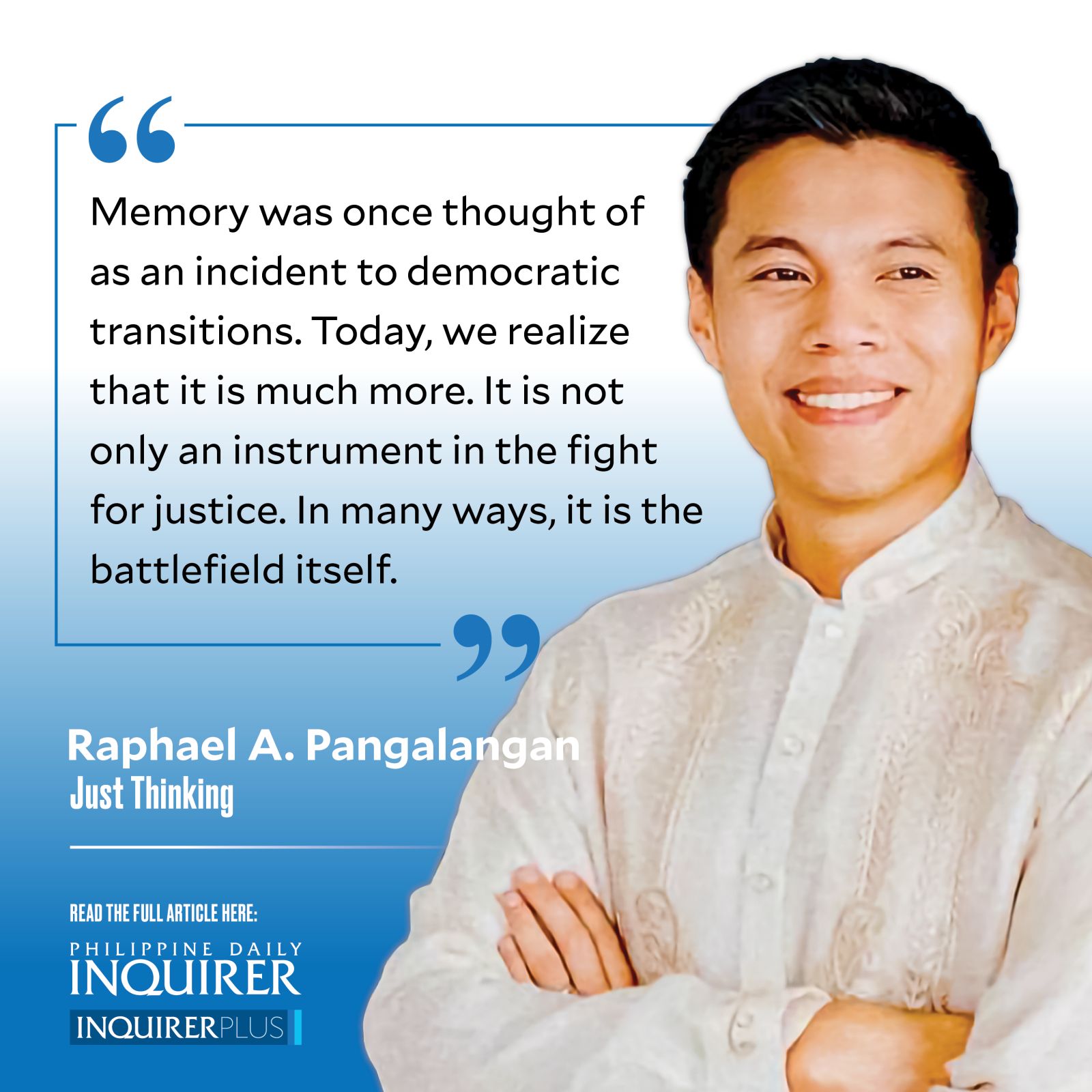On the battlefield of memory

Nations, like individuals, have short memories. These are the words of George A. Malcolm—associate justice of the Philippine Supreme Court, eponym to the University of the Philippines College of Law’s Malcolm Hall, and honorary Filipino pursuant to Republic Act No. 1386 (1955). As we celebrated the 37th anniversary of the Edsa People Power Revolution under the new Marcos Jr. presidency, these words rung true.
Last Saturday, I had the pleasure to speak at a UP Portia Sorority event titled “Revisiting Present Pasts.” The webinar zeroed in on the “proliferation of historical revisionism” and the legal constraints on forgetting. Given the political medley in which we find ourselves, the conversation was timely. Yet, in its own way, it was likewise timeless. Remembering the abuses of the Marcosian past, after all, cannot be solely conceived in terms of an “end goal” alone, as if it were a one-off thing, but as a continuing challenge we face today, tomorrow, always.
In my presentation, I sought to answer two questions: First, whether the state should have the power to determine historical narratives. Secondly, if the state does, then how may that power be validly exercised?
This first issue, as practical and straightforward as it may sound, encapsulates a much larger legal debate where two rights clashes: On one end, there is the right to free expression—that is, the right to hold an opinion, and to seek, receive, and impart information—and on the other, the right to truth, which is, in turn, abstracted from other fundamental rights, such as the rights to a remedy and due process of law.
Now, depending through which looking glass we gaze, the government regulation of historical revisionism may appear legitimate in the interest of truth, but intrusive from the perspective of speech. Governments, after all, are far from ideal candidates for honesty, and it is precisely for this reason that Alan Dershowitz of Harvard Law School has argued that “courts and governments should never be allowed to be arbiters of truth.” “From my experience,” he says, “[the] government is one of the worst judges of truth.”
On its face, Dershowitz raises a good point: The place where ideas should be shaped is not the courtroom, but the court of public opinion. It is for “We the people” to decide and distinguish between fact and faux. Truth is to be found by us, not foisted upon us.
Now, while this objection may be conceptually sound, quite frankly it is detached from reality. The Philippines and legal orders around the globe show that fact finding is not only a function of a government, but part and parcel of governance. Congress, for example, legislates “memorial statutes,” commemorating historical days and fallen heroes. Executive orders have created truth commissions, which the Philippine Supreme Court itself has recognized as not only a presidential power, but an executive mandate under the 1987 Constitution to “faithfully execute” the laws of the land. And of course, there is the judiciary, which hears and tries cases based on the “evidence”—or so we would hope.
All of these cases show how law and history are tightly intertwined. The elephant in the room, however, is how the state may find and preserve the truth without trampling on the freedom of thought. This leads us to the second question: How should the state exercise this authority?
We must first draw a conceptual distinction between fact on one hand, and opinion on the other. Courts around the world have relied on what has been doctrinally referred to as the fact/opinion distinction to regulate historical revisionism. From the German Constitutional Court in the Auschwitz Lie case to the US and Philippine Supreme Courts in Gertz v. Welsch and Borjal v. Court of Appeals, what we find is a consistent pattern of how statements of fact, as compared to opinions, are more susceptible to state regulation.
But does this mean, therefore, that opinions justifying human rights atrocities such as the Marcosian past are beyond state reach? Certainly not! The legal test simply changes.
Recall, in the Philippines, Marcos apologists advance two counternarratives: One denies that the human rights abuses of the Marcos dictatorship never occurred, while the other justifies these grave atrocities as but a price to pay for the “golden years.” The first refers to a matter of fact, but the latter glorification of the Marcos years is a matter of opinion. And when it comes to regulating opinion, the legal standard is placed much higher. Jurisprudentially, the legal obstacle to be hurdled is the “clear and present danger” test. Note, however, that what is sought to be suppressed here is not the idea per se, but the “real and imminent threat of substantive evil” the expression would bring.
Even opinions, therefore, glorifying and distorting the Marcosian past, may be regulated if carefully characterized as a dangerous act rather than simply a dangerous idea per se. Again looking to Germany for example, opinions glorifying the Holocaust has been classified as incitement to violence, to genocide, and as a form of revictimization—as clear and present danger, if you will. These same frameworks would have its place under Philippine constitutional order.
The event organizers may have invited me to speak on the legal nuances of historical revisionism, but I was pleased to see among my co-panelists Dr. Francis Gealogo (Department of History, Ateneo de Manila University) and Dr. Ma. Diosa Labiste (Department of Journalism, University of the Philippines)—the leading historians and journalists of our time. To the organizers’ credit, this sends the right message across. History and memory, by and large, should not be treaty solely as a legal matter. Civil society members from all fields play an equally vital role in the justice process.
Memory was once thought of as an incident to democratic transitions. Today, we realize that it is much more. It is not only an instrument in the fight for justice. In many ways, it is the battlefield itself.
——————–
thinkjustly@gmail.com




















